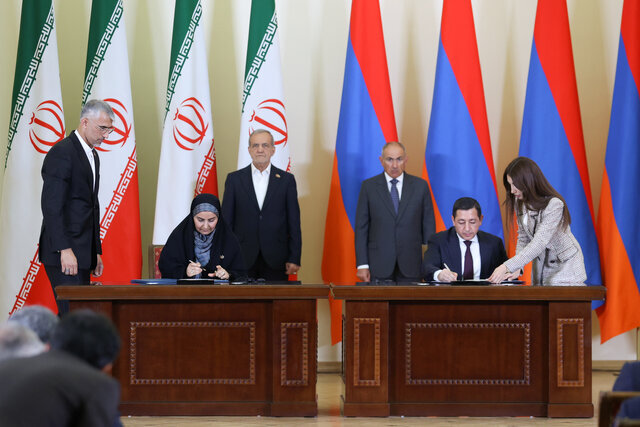South Caucasus route takes center stage in Iran-Armenia talks as two sides plan strategic pact

TEHRAN – Iran and Armenia have signed a series of cooperation agreements aimed at deepening their political, economic, and cultural ties, with both sides agreeing to finalize a comprehensive strategic cooperation document in the near future.
The agreements were finalized on Tuesday during President Masoud Pezeshkian’s official visit to Yerevan, where he met with Armenian Prime Minister Nikol Pashinyan. Both sides hailed their shared history and emphasized the importance of preserving the region’s stability amid growing geopolitical tensions.
Iranian Foreign Minister Abbas Araghchi also confirmed that both sides agreed to finalize a comprehensive strategic cooperation document in the near future, cementing the framework for long-term collaboration.
He said after the meetings that Armenia had given explicit assurances that no threat to Iran would ever originate from its territory.
“The negotiations were serious and wide-ranging,” he told reporters. “We discussed extensive cooperation in trade, investment, technical and engineering projects, as well as cultural cooperation, which is especially meaningful given our shared heritage.”
On the issue of transit routes and the recent discussions held in Washington, Araghchi said the Armenian side provided detailed explanations and stressed that it is fully aware of Iran’s red lines.
“Armenia will never allow its soil to be used to threaten Iran,” he said.
A border of friendship and cultural exchange: Pezeshkian
Speaking at a joint press conference with Pashinyan, Iranian President Pezeshkian described Armenia as a vital neighbor of the Islamic Republic of Iran, underlining the depth of ties forged over centuries.
“History testifies to the closeness of our peoples,” he said. “The Armenian community has long been present across Iran, particularly in border regions, and our shared cultural and civilizational heritage reflects the enduring friendship between the two nations.”
Pezeshkian characterized the Iran-Armenia frontier not as a dividing line but as a bridge of unity. “Our borders have, throughout the years, been frontiers of friendship and a link between our peoples, and they will remain so,” he said. Quoting the Persian poet Hafez, the president likened the spirit of the Aras River region to a flow of poetry, music, and hospitality across both sides of the border.
Iran expresses firm support for Armenia’s territorial integrity
Pezeshkian reiterated that Iran has consistently defended Armenia’s sovereignty and territorial integrity, calling this position a permanent and unchanging policy of the Islamic Republic.
“We oppose any resort to force or threat of force in the region,” he declared. “Politics and governance in the Caucasus must remain Caucasian.”
The president cautioned against attempts to outsource regional solutions to outside powers, stressing that the involvement of extra-regional actors only complicates an already sensitive situation.
He also underlined the need for Iran’s concerns to be addressed regarding recent regional developments, including the memorandum signed between Armenia, Azerbaijan, and the United States.
In meetings with senior Armenian officials, Pezeshkian emphasized that Tehran regards the continuation of warm relations with Yerevan as a serious policy priority. He announced Iran’s readiness to accelerate the finalization of a long-term strategic cooperation plan between the two countries.
“Our relations with Armenia are expanding in every field, from trade to cultural exchange,” Pezeshkian said. “But there is a need for more frequent consultations to remove obstacles and ensure the implementation of agreed projects.”
The president stressed that the deep historical, cultural, and civilizational ties between Iran and Armenia provide a strong foundation for further strengthening cooperation on the basis of mutual benefit.
During the visit, Iran and Armenia signed ten cooperation documents covering a broad spectrum of fields, including politics, culture, tourism, industry, education, transport and construction, healthcare, and the arts.
In addition, the two leaders signed a joint statement of the visit, reaffirming their mutual commitment to closer ties and long-term strategic partnership.
Pashinyan: Iran’s concerns on corridor will be respected
Prime Minister Pashinyan welcomed Pezeshkian’s visit, describing Iran as a crucial partner and pledging that Yerevan remains committed to preserving its historic friendship with Tehran.
He said Iran and Armenia possess diverse and complementary capacities that should be harnessed for the benefit of both nations.
Pashinyan underlined that Armenia’s border with Iran holds “strategic importance,” adding:
“Cooperation with Iran, under the principle of good neighborliness and the strengthening of friendly ties, carries strategic significance for Armenia. Without doubt, Iran’s concerns will be fully respected in the construction of any new corridor.”
The Armenian leader also announced that his country is ready to sign a long-term strategic partnership agreement with Tehran.
Following his talks with Pashinyan, Pezeshkian wrote on his X account that Tehran’s concerns about third-party forces near its shared border with Armenia must be fully addressed.
“In my meeting with the Armenian prime minister, I stressed that the policy of the Islamic Republic of Iran is to safeguard Armenia’s sovereignty and territorial integrity while maintaining friendly relations between our countries,” he wrote. “Our concerns regarding the presence of third-party forces near our common borders must be fully resolved.”
Pezeshkian’s visit comes at a time of heightened geopolitical activity in the South Caucasus, with international powers showing increasing interest in shaping the region’s future. Tehran has repeatedly warned against such interference, insisting that regional disputes must be resolved within the Caucasus itself.
Leave a Comment